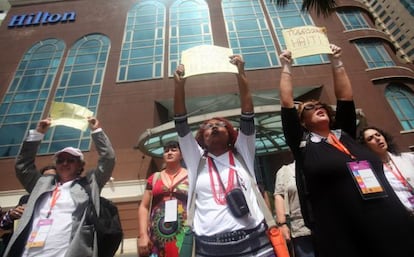Caricom considers ostracizing Dominican Republic over anti-Haitian ruling
St. Vincent PM threatens to ask Caracas to suspend nation from oil agreement Santo Domingo begins international initiative to explain top court’s decision

The recent decision to strip the nationalities of as many as 240,000 Dominican residents of Haitian origin is causing riptides across the Caribbean.
Some members of the Caribbean Community regional trade bloc (Caricom) are demanding tough action against their neighbor, including suspending the Santo Domingo government from Cariforum, the organization’s international group that promotes dialogue and cooperation with African, European and Pacific nations.
The call was publicly made on Tuesday by the prime minister of St. Vincent and the Grenadines, Ralph Gonsalves, who has also threatened to call on Venezuela to suspend Dominican Republic from Petrocaribe, the preferential oil-price program for Caribbean nations of which the Santo Domingo government is a beneficiary.
Aware of the international reaction to the Constitutional Court’s decision in September, Dominican officials have begun a diplomatic offensive – supported by the nation’s nationalist parties – to head off any repercussions by the ruling.
On September 23, the Constitutional Court in Santo Domingo revoked nationalities of all Dominicans born to foreigners from 1929 onward. The top court considered that the foreign-born parents were “in transit” in the country and their children cannot be considered Dominican nationals.
Both Caricom and the Inter-American Human Rights Commission have both expressed their concern that the ruling, which affects some four generations, is aimed at Dominicans of Haitian origin.
Kamla Persad-Bissessar, the prime minister of Trinidad and Tobago who serves as chairman pro tempore of the regional bloc, has asked members to reconsider Dominican Republic’s application for formal Caricom membership.
In a letter to Dominican President Danilo Medina on Monday, Gonsalves warned that if the situation is not fixed favorably for residents of Haitian descent in his country he will raise the matter “forcefully” at the December 13 summit of Petrocaribe in Caracas.
Dominican officials have begun
“My government and others have been very firm in their condemnation of the Court’s ruling and their profound disappointment at the equivocating stance of your government,” Gonsalves said. “My dear brother, I urge that you act swiftly in pursuing a path to correct the Court’s prejudiced denial of the human and citizenship rights of persons of Haitian descent born in your country.”
Medina’s government has sent a commission to Caracas to explain its stance on the ruling as part of its diplomatic offensive. On Tuesday, the Dominican Foreign Ministry issued a statement reminding its global partners that Dominican Republic was a sovereign state.
"Complying with President Danilo Medina’s orders, we have given all our ambassadors, consuls and representatives at the international organizations a document containing the official Dominican position, and with precise instructions to present it and explain it at all public forums in the countries and multinational institutions with whom we have relations, in order to avoid distortions and misinterpretations on the ongoing issue,” the ministry said in its statement.
“The goal is to provide accurate and objective information about the content of the ruling, as well as raise awareness and objectivity about the situation that it addresses,” the statement read.
In Dominican Republic, several organizations, which describe themselves as nationalistic, have come out in favor of the Constitutional Court’s ruling. They have also attacked international bodies that have criticized the decision.
On Wednesday, the Coordinator of Community Organizations and Neighborhood Boards in South Santiago, which groups more than 60 community associations in the country’s second largest city, declared “persona non grata” the local representative of the UN High Commissioner for Refugees (UNHCR).
Tu suscripción se está usando en otro dispositivo
¿Quieres añadir otro usuario a tu suscripción?
Si continúas leyendo en este dispositivo, no se podrá leer en el otro.
FlechaTu suscripción se está usando en otro dispositivo y solo puedes acceder a EL PAÍS desde un dispositivo a la vez.
Si quieres compartir tu cuenta, cambia tu suscripción a la modalidad Premium, así podrás añadir otro usuario. Cada uno accederá con su propia cuenta de email, lo que os permitirá personalizar vuestra experiencia en EL PAÍS.
¿Tienes una suscripción de empresa? Accede aquí para contratar más cuentas.
En el caso de no saber quién está usando tu cuenta, te recomendamos cambiar tu contraseña aquí.
Si decides continuar compartiendo tu cuenta, este mensaje se mostrará en tu dispositivo y en el de la otra persona que está usando tu cuenta de forma indefinida, afectando a tu experiencia de lectura. Puedes consultar aquí los términos y condiciones de la suscripción digital.









































